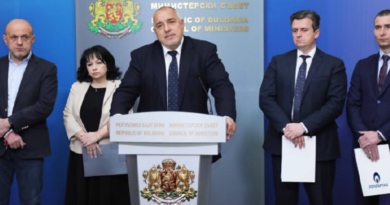Why Peace Will Remain Elusive Under Trump
Putin Exploits Negotiations as a Delay Tactic While Trump Clings to His “Peacemaker” Persona
Recent discussions between Donald Trump and Vladimir Putin expose the Russian president’s strategy: using negotiations to stall, prolong the conflict, and secure victory on his terms—Ukraine’s capitulation. In bilateral talks, a sustainable peace appears unattainable.
For Putin, projecting a willingness to negotiate is essential. He regards Trump’s presidency as a rare, unrepeatable opportunity, likely to end on January 20, 2029. Determined to meet his objectives by then, Putin pursues fruitless negotiations, offering vague promises of memorandums and roadmaps while Russia persists with missile barrages, airstrikes, and troop deployments for minimal territorial gains. These gains, he hopes, will solidify his legacy as the “great Putin,” who expanded Russia’s empire.
Incurable Messianism
Few in the West comprehend the depth of Putin’s messianic fervor. Frontline realities, economic pressures, or international isolation hold little influence over him. In his twilight years, he battles solely for his historical legacy, convinced he will remain a “tsar” until his final day. Without a victory he can portray as a triumph, history will label him another failed Russian warlord. Having publicly linked his success to Ukraine’s surrender, he cannot shift his narrative without self-contradiction.
Trump’s presidency offers Putin an ideal scenario. As “talks” drag on—from memorandums to ceasefire proposals—U.S. support for Ukraine remains minimal, undermining not only direct military aid and sanctions but also NATO’s collective decisions, which rely heavily on American participation.
Optimists highlight the Senate’s discussion of “nuclear sanctions” and allies’ plans to strangle Russia’s economy. Yet, the decisive gap between intent and action rests with Trump alone, not his advisors like Marco Rubio. Putin’s enthusiastic assertion that their recent call was “substantive and important” reinforces Trump’s illusion of Putin’s sincerity, perpetuating futile negotiations with no cessation of hostilities. At best, a prisoner swap might occur—a zero-sum gesture in a war that continuously claims new captives, where survivors are merely “fortunate” compared to the fallen.
Negotiations as a Façade
Putin shrewdly reads Trump’s psyche and the trap he has set for himself. Trump’s self-appointed role as a “peacemaker” overshadows any inclination to wield U.S. military or geopolitical power. He appears more focused on personal gain than geopolitics—yesterday, the war in Ukraine was not his concern; today, Israel’s conflict holds no interest either. This mindset undermines genuine peace—not only in Ukraine but globally, emboldening rogue actors worldwide. Autocrats like Putin exploit this ideological weakness without restraint, while Trump’s inflated self-esteem prevents him from acknowledging his missteps.
Two paths to peace exist. The first, through mutual agreement, emerges when warring parties recognize that continued conflict inflicts unbearable damage on society, the economy, and prospects for coexistence, potentially yielding greater benefits. Ukraine, for obvious reasons, is receptive to this, but Russia is not—Putin struggles to govern a peacetime nation with a faltering economy, where the only thriving sector is the military-industrial complex, sustained by war to distract millions of Russians from its narcotic allure. His control over public perception, reinforced by repression, ensures a degree of Russian tolerance for hardship.
Support Independent Analysis
Help us keep delivering free, unbiased, and in-depth insights by supporting our work. Your donation ensures we stay independent, transparent, and accessible to all. Join us in preserving thoughtful analysis—donate today!
Thus, negotiations under current conditions are futile, and Europe must draw a firm red line, declaring “enough is enough.” No level of flexibility from Ukraine or the EU can accommodate Trump’s erratic policy shifts.
The second path compels an unwilling party to negotiate by countering its territorial ambitions and nationalist zeal with resolute strength. From his first day in power, Putin has demonstrated that only force—soft or hard—secures his cooperation. Claims that sanctions alone cannot halt him hold partial truth, as repression suppresses Russian resistance despite declining living standards. Yet, this overlooks autocracies’ vulnerability to internal collapse, triggered by “black swans” or “gray rhinos.” Repressive systems demand escalating budgets to sustain an ever-expanding security apparatus and privileged regional elites.
Consider the myth of Russia’s “invincible” army, which failed to conquer Ukraine in three days and now fights for every inch at an astronomical human cost. Likewise, its “omnipresent” security forces cannot prevent systemic failures that destabilize their own ranks. Pouring money into repression—already strained as resources dwindle—is unsustainable. Even the $5 billion funneled through the FSB before the war to bribe Ukrainian elites failed to quell resistance, exposing a critical miscalculation in Putin’s strategy—he prioritized security services over the military, where corruption and nepotism had eroded the remnants of Soviet glory.
Beneath Putin’s regime’s apparent strength lies a fragile façade, propped up by ideology, militarized propaganda, and historical myths. As funds diminish, propaganda intensifies to mask the cracks.
Sanctions and Military Support: The True Path to Peace
Sanctions and robust military assistance to Ukraine represent the only viable strategy to end the war and establish lasting peace. Russia approaches a critical breaking point, driving Putin to employ aggressive bluffs during peace talks with Ukraine to avert internal collapse. Enhanced sanctions and resolute support for Ukraine will accelerate the moment when Putin recognizes the futility of his calculations. Appeasement, particularly in light of his malignant messianism, is destined to fail.
Western resolve, coupled with clear intent translated into action, surpasses the mere volume of aid provided. The principle is straightforward: substantial initial support reduces long-term costs. The sooner Ukraine can independently address its military and political challenges, the better, as threats to European security posed by Russia will endure beyond any ceasefire. The Kremlin will eventually acknowledge that, despite recent shifts toward China and broader Asian engagement, Russia’s identity remains intrinsically tied to Europe, and no Asian alignment can replace this connection.
Europe’s Moment of Truth
Europe stands at a crossroads: it must decide whether to emerge as an independent pillar in global security by increasing defense expenditures and fostering a self-sufficient arms industry, or to persist in appeasement—placating Trump as he mollifies Putin, banking on a return to “business as usual” after 2029 with dependence on U.S. weaponry purchases and military support.
Another critical juncture looms: if Ukraine is vital to Europe’s security framework today—not a decade hence—investing in its arms industry now offers greater strategic sense. This would bolster, at least in part, Ukraine’s long-term military autonomy, delivering superior cost-effectiveness compared to channeling funds solely through Europe’s defense sector, which would then supply weapons to Ukraine.
Trust, But Verify
Concerns regarding corruption in Ukraine and the potential misuse of European funds are legitimate yet manageable. Joint ventures underpinned by robust corporate governance can curb corrupt practices, while strengthened independent oversight ensures responsible expenditure.
The war in Ukraine, a novel form of conflict, presents Europe with an opportunity to refine its military doctrines and technologies. Nations that seize this chance will secure a strategic advantage, enhancing stability in the near future.
While Putin and Trump Chase Historical Legacies
Ultimately, Trump is unlikely to relinquish his conviction—mirroring Putin’s fixation on his historical legacy—that he alone can deliver peace, despite the war’s devastating toll in Ukraine or arguments that would sway any Western leader. His leadership style, teetering on a personality cult, stifles decisive action against Putin, disregarding recommendations from Congress, the State Department, the Department of Defense, or the intelligence community. And this is not going to change anytime soon. The notion that Putin must not be cornered, that Trump adheres to, fosters vague promises of negotiations devoid of firm ceasefire commitments.
Unable to concede his failure to convince Putin to end the conflict, Trump’s probable retreat hands Putin yet another triumph. Meanwhile, the theatrical backdrop of “Putin-wants-peace” serves as a pretext for continuing lucrative business with Russia and delaying new sanctions—an endgame favored by the Russian tsar.
Here lies Trump’s paradox: though he might earnestly seek peace, his policies postpone it, burdening him with accountability for future casualties and destruction. He might believe his strength lies in deliberate strategic ambiguity, keeping all options open, but in a raging war claiming lives and alienating allies, this approach equates to vulnerability and weakness rather than strategy. Such a tactic might have succeeded for a second-tier nation, not the United States—the country that has led and is expected to lead the world. The law of unintended consequences asserts itself once more.
Ilian Vassilev




